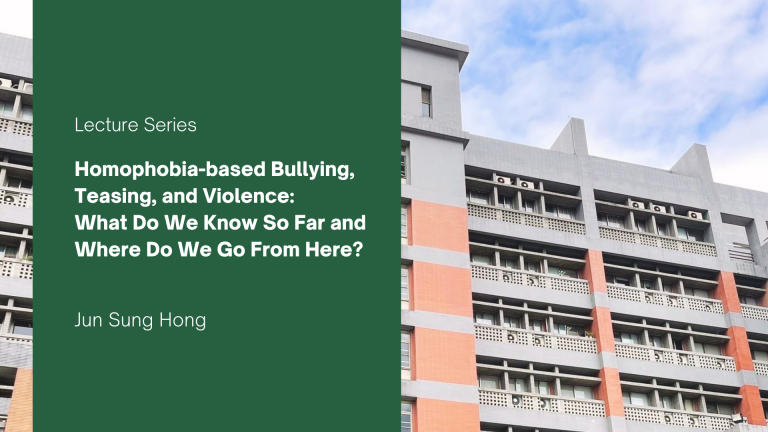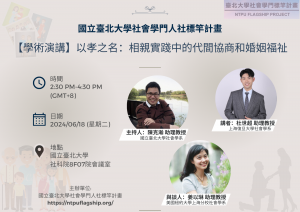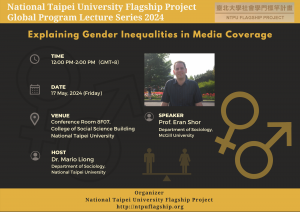
Speaker:
Professor Sung Jun Hong, Wayne State University School of Social Work
Professor Sung Jun Hong is a renowned scholar of social work with a particular focus on bias-based bullying amongst adolescents and young adults, and graciously gave a speech specifically discussing bullying targeted towards sexual minority youth via video conference.
A series of engaging questions invited the audience to reflect on incidents of bullying from their own school years, providing a personal, relatable and empathetic starting point before each chapter of Professor Hong’s speech. To begin with, interviews with bullied youth reveal the general reality of bullying amongst adolescents, one that is most commonly rooted in a sense of “otherness”. Whether it be due to a deviation from traditional gender stereotypes, speaking English with an accent, or being a racial minority, children and teenagers who are perceived as different by the wider, mainstream community are often harshly ostracised for their supposed differences. Whilst physical bullying would obviously threaten the feeling of safety for those targeted, verbal abuse can also result in substantial mental damage, and contribute to a significant decrease in the victims’ overall well-being. Sometimes, this can lead to thoughts of suicide in students as young as nine.
In particular, homophobic bullying has grown to become a public health concern worldwide. Homophobic bullying refers to bullying due to the sexual orientation and gender identity of the targeted, both actual (admitted truth by the victims themselves) and perceived (projected conclusions by the bullies, based on their perception of the victim). Since LGBTQ+ youth have the unique issue of “coming out”, a step to let another know of your sexual orientation or gender identity, they also face unique pressures when bullied. Often times, they find it especially difficult to report bullying, since it would inevitably involve coming out to the adults one makes the report to, and risk facing additional homophobia (re-victimisation) from them. A quick look at numbers is alarming: nearly 60% of interviewed LGBTQ+ students reported feeling unsafe at school, and over 70% would actively avoid unnecessary school-related activities (school dances, extracurriculars, etc.). Degrees of abuse vary worldwide, the percentage of LGBTQ+ youth that has experienced bullying at school remains alarmingly high across the board, with verbal abuse being the most common; Professor Hong pointed out that derogatory language based on sexual orientation or gender non-conformity is so common, so deeply rooted in our day-to-day life that teachers often fail to discipline or even respond to such verbal abuse. Unsurprisingly, the likelihood to attempt suicide is far higher amongst LGBTQ+ youth compared to heterosexual youth.
The Ecological Systems Framework is one often used by social workers to examine the influence of environments on one’s behaviour, and is especially helpful in identifying the factors behind homophobic bullying. The “environments” referred to here are usually significant to one’s day-to-day life, such as the home, the school, the neighbourhood, church, etc., extending to public policy as an indispensable factor. The “ecological systems” perspectives in which to examine how everything is s normal occurrence,]: “micro” (in which one build their most intimate relationships, such as school and family), “meso” (the relationship between microsystems, such as between peers and parents), “exo” (indirect environments such as parents’ workplace), and “macro” (general society, culture, public policies—or lack thereof). Studies show that having formed close emotional bonds with individuals from one’s “microsystem”—and receiving their support—can potentially negate the psychological trauma caused by targeted bullying; although support for LGBTQ+ youth across all ecological systems are detrimental to preventing homophobic victimisation, that of the microsystem remains most directly impactful.
As a closing thought, the audience is invited to reflect on how we or the authority figures around us responded to acts of bullying in school, pointing out that it is not uncommon for children to feel unable or simply unwilling to intervene. Policies have been implemented by the U.S. both on national and state levels, specifically to combat bias-based bullying targeting minority youth, including homophobic bullying. International awareness on the matter is also on the rise. However, homophobia in wider culture, especially youth culture, is still slow to change, and ostracisation of LGBTQ+ youth remains a prevalent factor of bullying; consistent attention and effort to prevent such abuse should continue to be a priority for policymakers, teachers, and authority figures alike in order to protect LGBTQ+ youth.



